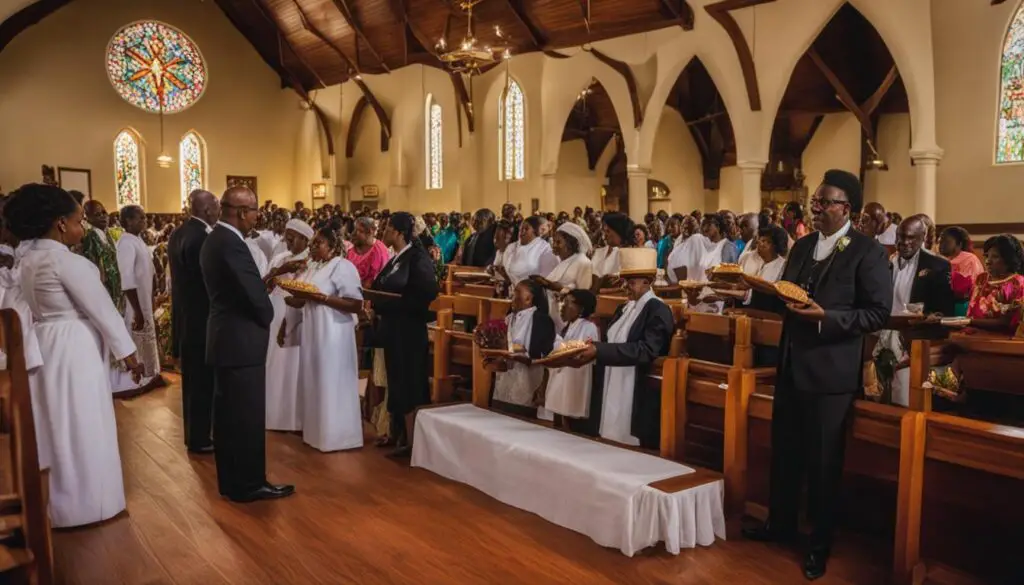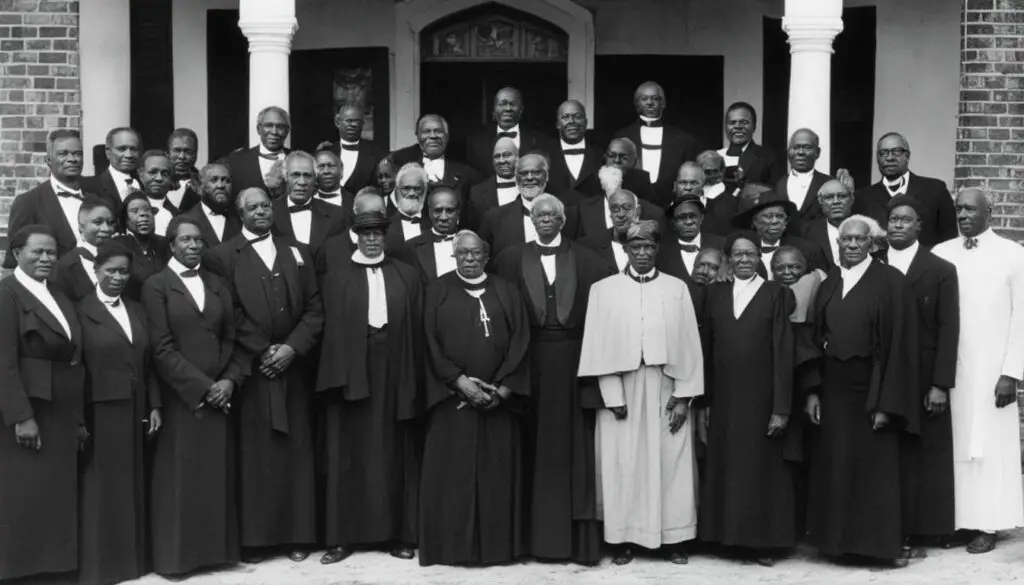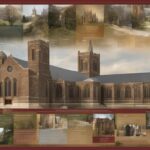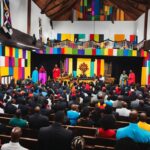The Presbyterian Church of Trinidad and Tobago has a rich and storied history that stretches back to its establishment by missionaries from the Presbyterian Church in Canada in 1836. The arrival of missionary Alexander Kennedy from Scotland marked the beginning of Presbyterianism in Trinidad and Tobago, as he founded the first Presbyterian congregation in Port of Spain and later established the Greyfriars Church, which continues to thrive to this day.
Over the years, the Presbyterian Church in Trinidad and Tobago has experienced significant growth and development. It gained autonomy in 1931, allowing it to make decisions independent of the Presbyterian Church in Canada, and achieved full independence in 1977. Today, the church boasts 108 congregations and proudly serves a membership of 40,000 devoted individuals.
Throughout its history, the Presbyterian Church of Trinidad and Tobago has remained steadfast in its commitment to spreading the Gospel and upholding the teachings of Presbyterianism. The church places a strong emphasis on the authority of scripture, the sovereignty of God, the atonement of Jesus Christ, and the necessity of faith for salvation. Additionally, the church embraces the importance of education and actively engages in community outreach efforts.
Key Takeaways:
- The Presbyterian Church in Trinidad and Tobago was established by missionaries from the Presbyterian Church in Canada in 1836.
- Pioneering missionary Alexander Kennedy played a key role in introducing Presbyterianism to Trinidad and Tobago.
- The church gained autonomy in 1931 and achieved full independence in 1977.
- The Presbyterian Church of Trinidad and Tobago has a membership of 40,000 and 108 congregations.
- The church’s beliefs align with the teachings of John Calvin and emphasize the authority of scripture and the sovereignty of God.
Origins of Presbyterianism in Trinidad and Tobago
Introducing Presbyterianism to Trinidad
Presbyterianism found its roots in Trinidad and Tobago with the arrival of missionary Alexander Kennedy from Scotland in 1836. Kennedy, driven by a desire to spread the teachings of Calvinism, established the first Presbyterian congregation in Port of Spain, the capital city of the twin-island nation. This marked the beginning of Presbyterianism in the region and laid the foundation for the growth and influence of the Presbyterian Church of Trinidad and Tobago.

A Founding Pillar: Greyfriars Church
As Presbyterianism took root in Trinidad, Alexander Kennedy went on to establish the Greyfriars Church, which stands as a testament to the enduring presence of the Presbyterian faith in the country to this day. Grayfriars Church, characterized by its striking architecture and sacred beauty, remains an important place of worship and a symbol of the strength and resilience of Presbyterianism in the region.
The establishment of the Greyfriars Church in Trinidad marked a pivotal moment in the development of the Presbyterian Church, serving as a gathering place for worship, fellowship, and spiritual growth. It continues to provide a spiritual home for the faithful and a beacon of hope and inspiration for the wider community.
Presbyterian Missions and Influence
While Alexander Kennedy played a significant role in the establishment of Presbyterianism in Trinidad, the Presbyterian Church in Canada also played a vital part in the growth and expansion of the faith in the country. The Presbyterian Church in Canada, driven by a missionary zeal, worked diligently to establish Presbyterian missions across Trinidad, particularly among the Indian immigrant population.
Over the years, the Presbyterian Church of Trinidad and Tobago has expanded its presence and influence through the establishment of primary and secondary schools, as well as the Presbyterian Theological Seminary. These institutions have served as centers of education, nurturing future generations of Presbyterian leaders and ensuring the longevity of the Presbyterian faith in Trinidad and Tobago.
| Pioneers of Presbyterianism in Trinidad and Tobago | Key Contributions |
|---|---|
| Alexander Kennedy | Established the first Presbyterian congregation and founded the Greyfriars Church. |
| Presbyterian Church in Canada | Played a vital role in establishing Presbyterian missions, particularly among Indian immigrants. |
Beliefs and Doctrines of the Presbyterian Church
The Presbyterian Church of Trinidad and Tobago holds steadfast to the beliefs and doctrines of Presbyterianism, a Christian denomination rooted in the teachings of John Calvin. These beliefs shape the foundation of the church, guiding its practices, mission, and outreach.
Presbyterian Beliefs:
- Sovereignty of God: Presbyterians believe that God is sovereign, meaning that He is the supreme authority over all things. They trust in God’s divine power and acknowledge His control over every aspect of life.
- Authority of Scripture: The Presbyterian Church upholds the Bible as the ultimate authority in matters of faith and practice. They believe that the Word of God offers guidance, wisdom, and truth for believers.
- Depravity of Humanity: Presbyterians recognize the fallen nature of humanity and the universal need for salvation. They believe that all people are born with a sinful nature and are in need of God’s grace and redemption.
- Atonement of Jesus Christ: Central to Presbyterian beliefs is the belief in the atoning sacrifice of Jesus Christ. They affirm that through His death and resurrection, Jesus paid the price for humanity’s sins, offering salvation and reconciliation with God.
- Necessity of Faith for Salvation: Presbyterians emphasize the necessity of faith in Jesus Christ for salvation. They believe that through faith, individuals can experience forgiveness, restoration, and eternal life in fellowship with God.
Importance of Education and the Mission:
The Presbyterian Church places a strong emphasis on education as a means of nurturing spiritual growth and equipping believers with knowledge and understanding. They prioritize the education and training of ministers, lay leaders, and church members, instilling a deeper understanding of Presbyterian beliefs and practices.
The mission of spreading the Gospel is also a vital aspect of the Presbyterian Church. Presbyterians actively engage in evangelism and outreach, sharing the message of salvation through Jesus Christ with others. The church seeks to make a positive impact in society by addressing spiritual, social, and humanitarian needs.
Quote:
“Our beliefs and doctrines as Presbyterians form an unshakable foundation for our faith. We stand firm on the sovereignty of God, the authority of Scripture, the atoning work of Jesus Christ, and the power of faith. As a church, we are committed to education and spreading the Gospel, seeking to transform lives and communities with the love and truth of Christ.” – Rev. James Thompson, Presbyterian Church of Trinidad and Tobago.

In the next section, we will explore the sacraments and rituals that hold significance in the worship practices of the Presbyterian Church.
Sacraments and Rituals in the Presbyterian Church
The Presbyterian Church recognizes two sacraments: baptism and the Lord’s Supper. Baptism, whether administered to infants or adults, symbolizes cleansing from sin and initiation into the Christian community. It is a solemn act of faith and obedience, following the example of Jesus Christ. Through baptism, individuals are welcomed into the Church and united with Christ and His people. It is a visible sign of inward transformation and the beginning of a lifelong journey of discipleship.
The Lord’s Supper, also known as communion or the Eucharist, is a commemoration of the sacrifice of Jesus Christ. It is a time of remembrance and thanksgiving, as believers partake of bread and wine, which represent the broken body and shed blood of Christ. The celebration of the Lord’s Supper is a solemn and joyful act of worship, drawing believers closer to the Savior and to one another as the body of Christ.
Worship services in the Presbyterian Church embrace the sacraments as integral components. They provide a sacred space for the congregation to engage in prayer, lift their voices in hymns of praise, listen to the reading and preaching of the Word, and partake in the sacraments. These rituals and symbols serve as powerful reminders of God’s grace and love, deepening faith and fostering spiritual growth.
“Through baptism and the Lord’s Supper, the Presbyterian Church celebrates the covenant relationship between God and His people, inviting them to experience the transformative power of God’s presence and grace.”
Presbyterian worship is characterized by its reverence, biblical focus, and congregational participation. The sacraments, along with other rituals and elements of worship, help create a sense of unity, meaning, and spiritual connection. They serve as conduits of God’s grace, enabling believers to encounter the divine and experience a deeper relationship with their Creator.

| Sacrament | Meaning | Mode of Administration | Participants |
|---|---|---|---|
| Baptism | Symbolizes cleansing from sin and initiation into the Christian community. | Often through sprinkling or immersion. | Infants and adults who profess faith in Christ. |
| Lord’s Supper | Commemorates the sacrifice of Jesus Christ and expresses unity with the body of Christ. | Through the sharing of bread and wine or grape juice. | Baptized believers in Jesus Christ. |
Leadership and Clergy in the Presbyterian Church
The Presbyterian Church values strong and dedicated leadership within its congregations. This leadership is provided by a system of elders who are elected by the congregation and serve as spiritual guides and decision-makers. These elders exemplify the qualities of presbyterian leadership, bringing wisdom, empathy, and integrity to their roles.
In addition to the elders, the Presbyterian Church is blessed with ordained ministers, also known as pastors, who play a vital role in providing pastoral care, preaching the Word of God, and administering the sacraments. These presbyterian clergy members are called to shepherd their congregations, offering guidance and support in times of both joy and sorrow.
Worship services in the Presbyterian Church are led by these dedicated ministers, who bring the Word of God to life through their sermons and teachings. These services may also involve the participation of elders and other members of the congregation, fostering a sense of community and active engagement in presbyterian church services.

“In the Presbyterian Church, we believe that strong leadership and a committed clergy are essential to nurturing a vibrant and faithful community. Our elders and ministers play a crucial role in guiding us on our spiritual journey and ensuring that our worship services are meaningful and transformative.”
Worship Practices in the Presbyterian Church
Worship in the Presbyterian Church is a meaningful and transformative experience that combines both traditional and contemporary elements. It is a time for congregants to gather in unity, praise, and connect with God.
At a typical Presbyterian worship service, you can expect to participate in a variety of practices that draw from the rich traditions of the church. These practices include:
- Hymns: Congregational singing plays a central role in Presbyterian worship. Hymns are carefully chosen for their theological depth and ability to inspire worshipers. Through the powerful medium of music, the congregation expresses their faith, praises God, and finds solace and strength.
- Prayers: Prayers are offered to communicate with God, seek His guidance, express gratitude, and intercede for others. They form an integral part of worship, providing an opportunity for individuals to bring their joys, sorrows, and concerns before the Lord.
- Scripture Readings: The reading of scripture is a vital part of Presbyterian worship. Selected passages from the Old and New Testaments are read aloud, emphasizing the importance of God’s Word in guiding and shaping the faith of the congregation.
- Sermons: A sermon, delivered by the minister or guest preacher, is a central component of the worship service. Through biblical exposition, the sermon aims to teach, inspire, and challenge the congregation, helping them apply God’s Word to their lives.
- The Celebration of Sacraments: The Presbyterian Church recognizes two sacraments: baptism and the Lord’s Supper. Baptism, usually administered to infants and adults, signifies initiation into the Christian community. The Lord’s Supper, also known as communion, commemorates the sacrifice of Christ and fosters a deep sense of unity among believers.
The order of worship in the Presbyterian Church may follow a set liturgical pattern or vary according to the liturgical season or theme. This allows for a balanced and intentional flow of worship, creating a harmonious environment that engages the congregation and fosters a deep connection with God.

Sacred Texts in the Presbyterian Church
The Presbyterian Church holds the Bible as its primary sacred text, viewing it as the inspired Word of God. The scriptures are at the heart of the church’s faith and practice, serving as a guide for worship, teaching, and spiritual growth.
Here are some of the key features of the Presbyterian Church’s approach to sacred texts:
Bible as the Word of God
The Bible is considered the authoritative and divinely inspired Word of God. It is viewed as a collection of sacred writings that reveal God’s will, provide spiritual guidance, and convey the message of salvation through Jesus Christ.
Study and Interpretation
The Presbyterian Church places a strong emphasis on the study and interpretation of scripture. Through sermons, Bible studies, and theological education, members of the church are encouraged to engage with the scriptures, seeking a deeper understanding of God’s message and its application to their lives.
Westminster Confession of Faith
“The Westminster Confession of Faith is a secondary source of authority and guidance for the Presbyterian Church.”
In addition to the Bible, the Presbyterian Church draws on the Westminster Confession of Faith and other Reformed confessions as secondary sources of authority and guidance. These confessions articulate the church’s beliefs, doctrines, and principles, providing a framework for theological interpretation and addressing contemporary issues.
Through the study and application of these sacred texts, the Presbyterian Church seeks to deepen its understanding of God’s word, grow in faith, and live out its mission of spreading the Gospel and serving others.
Denominations and Sects within the Presbyterian Tradition
Within the Presbyterian tradition, there are various denominations and sects that have emerged, each with its unique characteristics and beliefs. While they may have distinct organizational structures and practices, they all share the core beliefs and principles of Presbyterianism.
Presbyterian Church in Canada
The Presbyterian Church in Canada is one of the denominations within the Presbyterian tradition. It has a strong presence in Canada and is known for its commitment to social justice and equality. The church emphasizes the authority of scripture and the importance of community outreach.
Presbyterian Church (USA)
The Presbyterian Church (USA) is another significant denomination within the Presbyterian tradition. With approximately 1.4 million members, it is one of the largest Presbyterian denominations worldwide. The church is characterized by its inclusive stance on social issues and its promotion of interfaith dialogue.
Presbyterian Church of Scotland
The Presbyterian Church of Scotland, also known as the Church of Scotland, is the national church of Scotland and a prominent denomination within the Presbyterian tradition. The church has deep historical roots and plays a significant role in Scottish society. It upholds a Reformed theology and is known for its emphasis on education and social welfare.
These are just a few examples of denominations and sects within the Presbyterian tradition. Each group contributes to the diversity and richness of the Presbyterian Church, while preserving the core principles and values that define Presbyterianism as a whole.
Community and Outreach in the Presbyterian Church
The Presbyterian Church of Trinidad and Tobago is dedicated to fostering a strong sense of community and making a positive impact through outreach efforts. The church actively engages in a variety of community projects and social initiatives, with a particular focus on education, healthcare, and poverty alleviation. By addressing these critical needs, the Presbyterian Church aims to uplift individuals and families, promoting holistic well-being and social justice.
Moreover, the church encourages its members to actively participate in local and international mission work. By partnering with other organizations, the Presbyterian Church extends its reach and influence, tackling global issues and making a tangible difference in the world. Through these collaborative efforts, the church hopes to create lasting change, promoting peace, equality, and compassion on a broader scale.
As a beacon of worship and spiritual growth, the Presbyterian Church is committed to creating a nurturing environment that embraces individuals from all walks of life. It seeks to provide a platform for affirmation and learning, encouraging people to explore their faith, ask questions, and engage in meaningful dialogue. By fostering a sense of belonging and acceptance, the church strives to build a strong Presbyterian community that is united in faith and dedicated to serving others.
FAQ
What is the history of the Presbyterian Church in Trinidad and Tobago?
The Presbyterian Church of Trinidad and Tobago was established by missionaries from the Presbyterian Church in Canada in 1836. It has a rich history dating back to the arrival of missionary Alexander Kennedy from Scotland in 1836. The church has gone through various stages of development, gaining autonomy in 1931 and full independence in 1977. Today, it has 108 congregations and a membership of 40,000.
When was Presbyterianism introduced to Trinidad and Tobago?
Presbyterianism was introduced to Trinidad with the arrival of missionary Alexander Kennedy from Scotland in 1836. Kennedy established the first Presbyterian congregation in Port of Spain and later founded the Greyfriars Church, which is still active today. The Presbyterian Church in Canada also played a significant role in establishing Presbyterian missions in Trinidad, particularly among Indian immigrants.
What are the beliefs and doctrines of the Presbyterian Church?
The Presbyterian Church of Trinidad and Tobago adheres to the beliefs and doctrines of Presbyterianism, which are based on the teachings of John Calvin. These include the sovereignty of God, the authority of scripture, the depravity of humanity, the atonement of Jesus Christ, and the necessity of faith for salvation. The church also places a strong emphasis on the importance of education and the mission of spreading the Gospel.
What are the sacraments and rituals in the Presbyterian Church?
The Presbyterian Church recognizes two sacraments: baptism and the Lord’s Supper. Baptism is administered to infants and adults, symbolizing cleansing from sin and initiation into the Christian community. The Lord’s Supper, also known as communion or the Eucharist, is a memorial of the sacrifice of Christ and is open to all baptized believers. Worship services in the Presbyterian Church typically involve prayer, hymns, scripture reading, preaching, and the celebration of the sacraments.
What is the leadership structure in the Presbyterian Church?
The leadership structure of the Presbyterian Church is governed by a system of elders. Elders are elected by the congregation and serve as spiritual leaders and decision-makers within the church. Ministers, also known as pastors, are ordained individuals who provide pastoral care, preach the Word, and administer the sacraments. Worship services are led by ministers and may also involve the participation of elders and other members of the congregation.
What are the worship practices in the Presbyterian Church?
Worship in the Presbyterian Church is characterized by a blend of traditional and contemporary elements. Services typically include hymns, prayers, scripture readings, a sermon, and the celebration of the sacraments. The liturgy may follow a set order or vary according to the liturgical season or theme. The Presbyterian Church also values the use of music in worship, with congregational singing and choirs playing an integral role.
What are the sacred texts in the Presbyterian Church?
The primary sacred text of the Presbyterian Church is the Bible, which is regarded as the inspired Word of God. The church places a strong emphasis on the study and interpretation of scripture, with sermons and Bible studies being central to worship and spiritual growth. The Presbyterian Church also draws on the Westminster Confession of Faith and other Reformed confessions as secondary sources of authority and guidance.
Are there different denominations within the Presbyterian tradition?
Within the Presbyterian tradition, there are various denominations and sects with their unique characteristics and beliefs. Some of the denominations and sects that exist within the Presbyterian Church include the Presbyterian Church in Canada, the Presbyterian Church (USA), and the Presbyterian Church of Scotland. Although they may have distinct organizational structures and practices, they all share the core beliefs and principles of Presbyterianism.
What is the role of the Presbyterian Church in the community?
The Presbyterian Church of Trinidad and Tobago places a strong emphasis on community and outreach. The church is actively involved in various community projects and social initiatives, including education, healthcare, and poverty alleviation. It also encourages its members to engage in mission work both locally and internationally, partnering with other organizations to make a positive impact in the world. The Presbyterian Church strives to be a beacon of worship, affirmation, learning, and spiritual growth for all people.
















